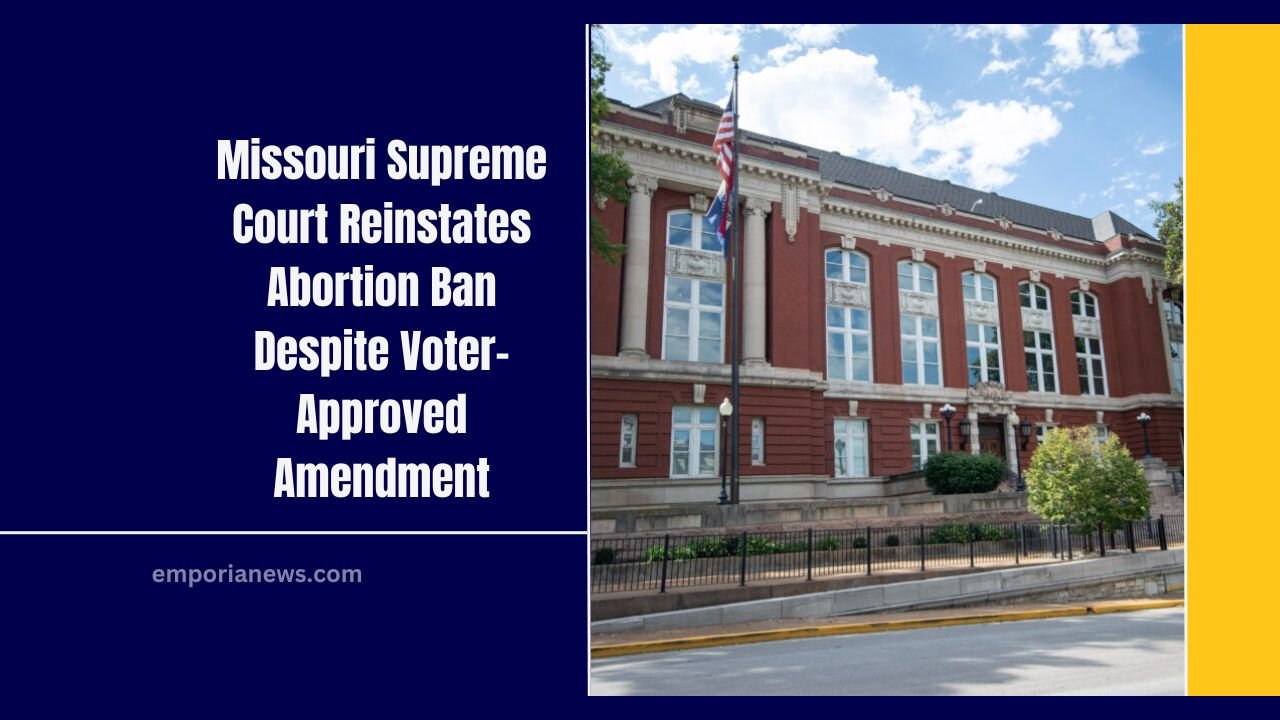In a significant legal development, the Missouri Supreme Court has reinstated the state’s near-total abortion ban, overriding a voter-approved constitutional amendment that had aimed to secure reproductive rights.
This decision has led to the immediate suspension of abortion services across Missouri, reigniting debates over judicial authority and voter intent.
Background: Amendment 3 and Its Aftermath
On November 5, 2024, Missouri voters narrowly passed Amendment 3, a constitutional amendment guaranteeing the right to reproductive freedom, including abortion access up to the point of fetal viability (approximately 24 weeks).
The amendment received 1,538,659 votes in favor and 1,443,022 against, reflecting a 51% majority .
Following the amendment’s adoption, Planned Parenthood and other advocates filed lawsuits challenging existing abortion restrictions, leading to temporary injunctions that allowed abortion services to resume in the state.
Supreme Court’s Decision: Legal Standards and Implications
On May 27, 2025, the Missouri Supreme Court ruled that Circuit Judge Jerri Zhang had applied an incorrect legal standard in her decisions to block the state’s abortion ban.
The court emphasized that potential harms from allowing abortions to resume should have been considered before issuing injunctions .
As a result, the court ordered Judge Zhang to vacate her previous rulings and reevaluate the case using the appropriate legal framework.
This decision effectively reinstated the abortion ban, prompting Planned Parenthood to halt abortion services and cancel appointments at its clinics in Columbia and Kansas City .
Reactions from Stakeholders
- Attorney General Andrew Bailey: Praised the Supreme Court’s decision as a victory for women’s health and safety, asserting that abortion providers must comply with state laws regarding safety and sanitation requirements .
- Planned Parenthood: Expressed disappointment, stating that the ruling undermines the will of Missouri voters and places patients in a precarious position. Emily Wales, President and CEO of Planned Parenthood Great Plains, emphasized the organization’s commitment to restoring abortion access through legal avenues .
- Campaign Life Missouri: Sam Lee, director of the organization, welcomed the decision, highlighting that pro-life laws with health and safety protections for women remain in place .
Current Legal Landscape and Future Outlook
Despite the passage of Amendment 3, the reinstatement of the abortion ban underscores the complex interplay between voter-approved measures and existing state laws.
The case challenging the ban is scheduled for trial in January 2026, leaving abortion access in Missouri in a state of uncertainty until then.
Additionally, Missouri lawmakers have approved a new ballot measure for the 2026 election that aims to reimpose the abortion ban, with exceptions for cases of rape or incest. If passed, this measure could further complicate the legal status of abortion in the state .
Key Events Timeline
| Date | Event |
|---|---|
| June 24, 2022 | Missouri’s trigger law banning abortions takes effect following the Dobbs decision. |
| November 5, 2024 | Voters pass Amendment 3, enshrining reproductive rights into the state constitution. |
| December 2024 | Judge Zhang rules the abortion ban unconstitutional based on Amendment 3. |
| February 2025 | Judge Zhang strikes down licensing requirements, allowing abortions to resume. |
| May 27, 2025 | Missouri Supreme Court reinstates abortion ban, citing incorrect legal standards used. |
| January 2026 | Scheduled trial date for the case challenging the abortion ban. |
The Missouri Supreme Court’s decision to reinstate the abortion ban, despite a voter-approved constitutional amendment, highlights the ongoing legal complexities surrounding reproductive rights in the state.
As the case progresses toward a 2026 trial, the future of abortion access in Missouri remains uncertain, reflecting broader national debates on the balance between judicial authority and democratic processes.




